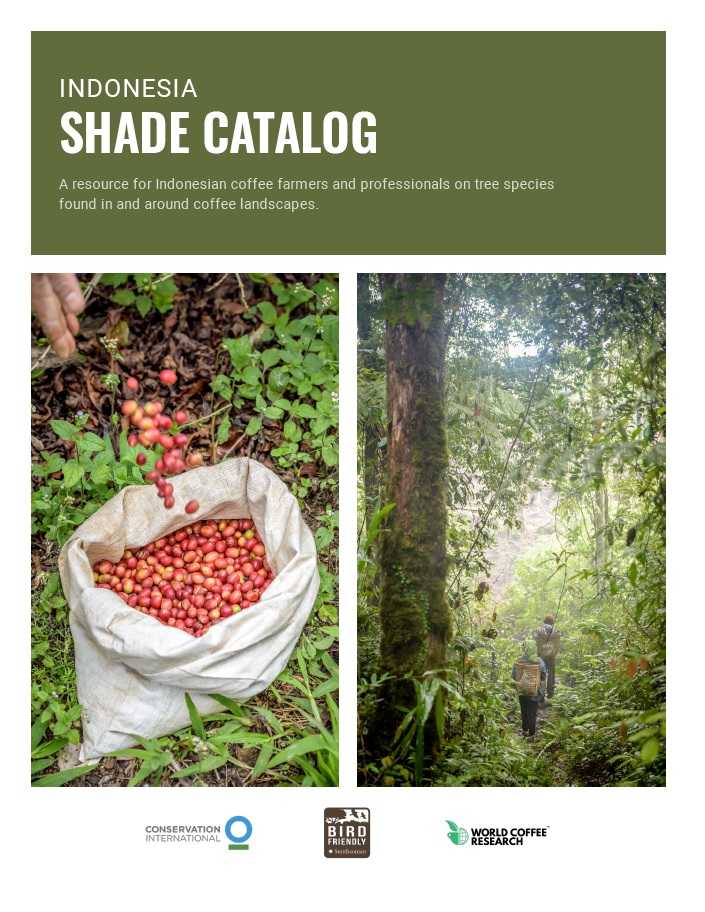ARLINGTON, VA, US – Indonesian coffee farmers and professionals interested in using agroforestry to support climate resilience have a new tool at their disposal: The Shade Catalog. Available in both English and Bahasa, the Catalog helps farmers select shade trees that are good for coffee, support and diversify household incomes and provide benefits to wildlife and ecosystem services. The Shade Catalog isavailable in a mobile-friendly online format and free download atshadecoffee.org.
The Catalog was jointly produced by Conservation International, the Smithsonian Migratory Bird Center and World Coffee Research, with funding from The Starbucks Foundation. Its collaborative development involved the expertise of over two dozen agroforestry, tree biology, coffee industry experts and farmer groups.
“We hope to encourage farmers and industry decision-makers to implement agroforestry systems that sustain both people and the environment,” said Dr. Ruth Bennett, Research Ecologist at the Smithsonian Migratory Bird Center. “Coffee is a unique crop because it can be grown with trees, to benefit climate, biodiversity and farmers alike. This catalog is a starting point for similar work in coffee-growing regions around the world.”
Shade trees on coffee farms are an integral resource for farmers, wildlife and the coffee crop itself. But farmers and practitioners often lack information about the tree species found in coffee landscapes: do they have economic uses, like timber or food production? Do the trees compete or complement coffee production? Do they support biodiversity and wildlife?
“As the climate crisis worsens conditions for farmers around the globe, retaining and replanting trees in coffee landscapes will play an increasingly critical role for sustaining coffee agriculture and livelihoods,” says Raina Lang, Senior Director of Sustainable Coffee at Conservation International.
The Shade Catalog gathers existing data on trees found in coffee landscapes – from the species’ main attributes, uses and benefits to propagation and management tips – and makes it freely accessible to support whole-farm planning.
“Tools like The Shade Catalog are critical for supporting coffee agroforestry to help combat the effects of climate change and support income diversification strategies,” says Vern Long, CEO of World Coffee Research.
The Catalog’s first edition focuses on Indonesia, one of the world’s largest producers and exporters of coffee with nearly 2 million smallholder coffee farmers managing 1.2 million hectares of coffee land in one of the most biodiverse areas on the planet. Future editions of the Catalog will expand to cover other critical coffee producing countries, beginning with Peru in 2022.
The Catalog is intended to be a living document and will be updated as more information or research becomes available for the included tree species.
Conservation International works to protect the critical benefits that nature provides to people. Through science, partnerships and fieldwork, Conservation International is driving innovation and investments in nature-based solutions to the climate crisis, supporting protections for critical habitats, and fostering economic development that is grounded in the conservation of nature.
The Smithsonian Migratory Bird Centeris a scientific research organization dedicated to understanding, conserving and championing the grand phenomenon of bird migration. The Center’s pioneering, Bird Friendly® coffee certification is the gold standard in eco-friendly, organic coffee farming, and has supported over 20 years of research linking coffee agroforestry with biodiversity conservation.
World Coffee Researchdrives a global, collaborative agricultural research agenda for coffee. World Coffee Research was formed by the world-wide coffee industry in 2012, in recognition that innovation in coffee agriculture is necessary to deliver increased quality, reduce supply chain risk, and transform coffee producing into a profitable, sustainable livelihood that can meet rising demand while also safeguarding natural resources in the face of the climate crisis.


















